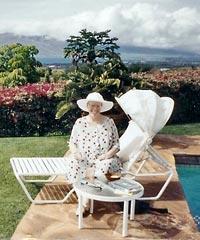|
Friday, April 23, 2010 - Page updated at 03:17 PM Information in this article, originally published October 19, 2006, was corrected October 22, 2006. A previous version of this story incorrectly stated that Ann Chadwick was 41 when she died of ovarian cancer. She was 43 Your Courts, Their Secrets Life-or-death question, but debate was hidden for yearsSeattle Times staff reporters Five years ago in King County, an important and novel question loomed over a wrongful-death lawsuit against Virginia Mason Medical Center: If you're almost certain to inherit a deadly cancer but can cheat fate by having a healthy organ removed now, are doctors required to alert you to the life-saving surgery? In the Virginia Mason case, the family of a Bainbridge Island woman, described as a "walking time bomb" for cancer, argued that the answer is yes. The family's lawsuit, which was settled in 2001 for $1.6 million, raised the kind of question that moves a legal dispute's stakes beyond the narrow interests of the parties and into the public arena, offering insight to doctors, lawyers and patients. But the lawsuit — apparently the first to argue that doctors must try to prevent hereditary disease, not just treat it — has never been written about before. A court commissioner sealed the entire file, violating court rules that govern secrecy. That meant the story could not be told of Ann Chadwick, a nurse who died at 43 of ovarian cancer, leaving behind her husband and a 10-year-old daughter. If her ovaries had been removed, Chadwick's chances of premature death would have been reduced dramatically, according to medical experts. Dr. Henry Lynch, a national expert on hereditary cancers who studied Chadwick's medical file for her family, wanted to write about the novel case in a prominent medical journal but decided not to for fear of violating a confidentiality agreement attached to the settlement. "Nobody is going to bring this woman back from the dead," said Adam Morrow, a lawyer who represented Chadwick's family. But, he said, a public airing of her story "could sure save a lot of other lives." The Chadwick lawsuit was unsealed in response to a motion by The Seattle Times as part of an ongoing investigation, "Your Courts, Their Secrets." That investigation has identified hundreds of lawsuits in King County that were improperly sealed, concealing missteps by government agencies and potential dangers to the public. So far, motions filed by the newspaper have unsealed 34 lawsuits. Virginia Mason disputed the claims of Chadwick's family and made no admissions as part of the settlement. It did not oppose the newspaper's motion to unseal the lawsuit. "Really young to die" Ann Chadwick was a nurse at the University of Washington who enjoyed traveling, gardening and reading. When Chadwick was 28, she developed cancer in her right breast. At 37, she was treated for a different kind of cancer in her left breast. "She wanted to live and be there for her daughter," said Holly Garrett, a longtime friend who noted that Chadwick was careful to stay on top of her health issues. Chadwick saw Dr. Robert Rudolph, a Virginia Mason oncologist, at least a dozen times from 1993 on. Rudolph also was a professor at the University of Washington School of Medicine and a staff member at the Fred Hutchinson Cancer Research Center. He noted early on in Chadwick's medical chart that her mother had breast cancer and her maternal grandmother had ovarian cancer, records show. Chadwick also was treated by Dr. Kim Leatham, her family physician on Bainbridge Island. Starting in mid-1995, Chadwick began complaining to her doctors about pelvic and abdominal pain. Her doctors missed repeated opportunities to refer her to a gynecologist or order a pelvic ultrasound, according to the suit. In December 1996, Chadwick underwent surgery for advanced ovarian cancer. She underwent chemotherapy, radiation and a stem-cell transplant. She died April 11, 1999, four months shy of her 44th birthday. "Many people miss her still," Garrett said. "And she was young. That's really young to die." Chadwick's husband, Thomas Moench, recalled that his wife wore head coverings while undergoing chemotherapy, but one day decided that "being bald was who she was." During a presentation to her daughter's class, a boy came up to Chadwick and said, "You're scary." "With a big smile on her face she said something akin to 'Well, I would imagine so,' " Moench said. "She could be very disarming." Hereditary hallmarks Morrow and Christopher Otorowski, lawyers hired by Chadwick's family, concluded they could not prove that a delay in diagnosing Chadwick's cancer caused her death. So they made this argument: Based on medical literature, doctors should have anticipated Chadwick's cancer and removed its target. But her doctors failed to advise her about having her ovaries removed, her family's suit said. "This theory, to the best of counsel's knowledge and belief, after performing extensive research, had never been alleged in a medical malpractice case," the lawyers wrote in court documents. They argued she had "obvious hereditary cancer syndrome," citing "medical literature for several decades in hundreds and hundreds of articles and textbooks." With her two breast cancers and her family history of breast and ovarian cancer, Chadwick displayed "hereditary hallmarks" that put her at high risk for developing ovarian cancer, the family's medical experts noted. One of the experts, Dr. Lynch of Creighton University in Nebraska, first identified hereditary cancer syndrome in 1974. In Chadwick's case, he stated that it was not a question of "if" she was going to develop ovarian cancer but "when." Another expert, Dr. Hoa Nguyen, a Florida oncologist, said Chadwick was a "walking time bomb waiting to develop ovarian cancer." Settled and sealed In 2001, the lawsuit was settled for $1.6 million. Court Commissioner Carlos Velategui then agreed to seal the file. He used a fill-in-the-blank form that failed to require a showing of "compelling circumstances," the legal standard for such secrecy. "I don't have any trouble sealing it," he said in court. The suit was sealed on a motion by the plaintiffs, but Morrow said Virginia Mason wanted secrecy as a condition of settlement. Virginia Mason spokeswoman Kim Davis said the sealing request was entirely the plaintiffs'. Virginia Mason went along to protect the privacy of Chadwick's daughter, who received some of the money, said Sarah Patterson, Virginia Mason's hospital administrator. The hospital settled to help Chadwick's husband and daughter, Patterson said. "A trial was not going to help matters. It would prolong the pain." The lawsuit's outcome was never reported to an electronic database of jury verdicts and settlements. The database lets lawyers know what kinds of arguments have been made in previous cases, on what facts, and with what result. The database also names each case's lawyers and expert witnesses, so that other attorneys can call for guidance. In addition, Lynch wanted to write about the case, with Morrow, in a medical journal. But Virginia Mason objected, Morrow said. Virginia Mason's Davis said Lynch was free to write about the case as long as Morrow didn't contribute, because he was barred under the settlement. Rudolph, Chadwick's oncologist who is now retired, declined to comment for this story, citing patient confidentiality. But he defended himself in 2001, after a report of the settlement to the state Department of Health. Rudolph told state officials that he had no reason to suspect a hereditary risk of ovarian cancer in Chadwick's case. Leatham, Chadwick's family doctor, said that a major study documenting the benefits of preventive surgery for hereditary cancer wasn't completed until about the time of Chadwick's death. Some doctors believed that a patient shouldn't be put through such surgery without clear evidence of hereditary risk, she said. Chadwick "got the best care she should have for what was known at the time," Leatham said. After the study, hereditary counseling became standard at Virginia Mason, she said. New procedures Patterson, the Virginia Mason administrator, said the hospital had only one other completely sealed case in the past 15 years. It was a 1998 lawsuit by a female patient who alleged that a Virginia Mason doctor wrongly prescribed a cream that permanently damaged the patient's vagina. The lawsuit was settled for $450,000. Since those cases, Virginia Mason has adopted policies that make it unlikely the hospital would seek to seal such suits, Patterson said. "That was then. This is now," she said. Patterson said Virginia Mason's doctors, nurses and staff now try to identify medical mistakes and share findings. New procedures were adopted after a highly publicized case in 2004 in which a patient was mistakenly injected with cleaning solution and died. Hospital officials admitted a lethal error. The case was settled for a confidential sum. But Virginia Mason released many of the facts, admitted liability and apologized. Some of the settlement money went to teach Virginia Mason staffers about the importance of proper labeling. "It's important to the public to have full information," Patterson said. Steve Miletich: 206-464-3302 or smiletich@seattletimes.com Ken Armstrong: 206-464-3730 or karmstrong@seattletimes.com Copyright © 2006 The Seattle Times Company |
Seattle Times Special
Miracle Machines: The 21st-Century Snake Oil
The Favor Factory
Confronting Malaria
Pike Place Market
Your Courts, Their Secrets
License to Harm
The Bering Sea
Olympic Sculpture Park |











